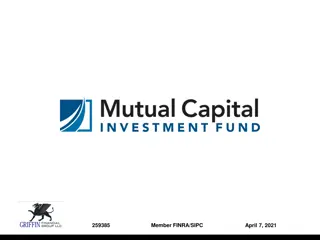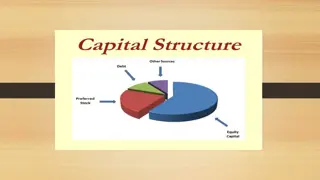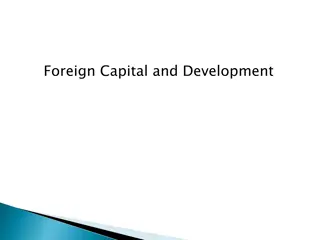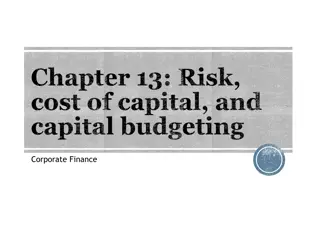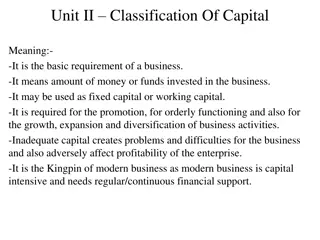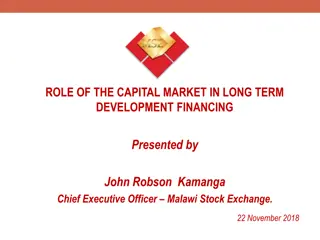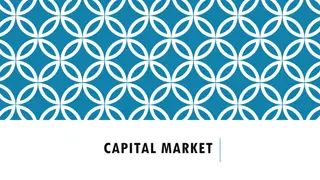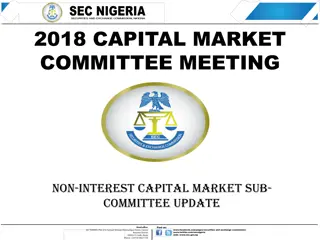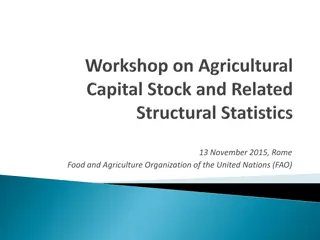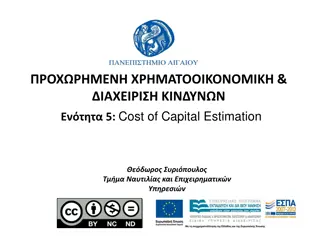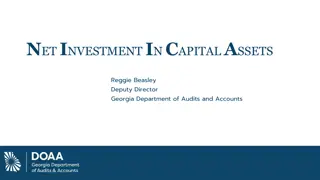Understanding Capital Market Development and Ethics in Africa
Explore the nexus between capital market development, ethics, and the role of professional accountants in Africa's Agenda 2063 for inclusive and sustainable economic growth. Delve into the importance of ethical foundations, transparency, and trust in fostering fair and efficient capital markets. Learn about the preconditions, barriers, and key instruments essential for the development of capital markets in Nigeria.
Download Presentation

Please find below an Image/Link to download the presentation.
The content on the website is provided AS IS for your information and personal use only. It may not be sold, licensed, or shared on other websites without obtaining consent from the author. Download presentation by click this link. If you encounter any issues during the download, it is possible that the publisher has removed the file from their server.
E N D
Presentation Transcript
CAPITAL MARKET DEVELOPMENT AND ETHICS Prof Uche Uwaleke Being a Lecture delivered at the 27thAnnual National Conference of the Association of National Accountants of Nigeria. Sept 13 2022 Prof Uche Uwaleke presentation 1
Outline Introduction Capital Market Development Ethics Ethical Factor in Capital Market Development Role of the Professional Accountant Conclusion Prof Uche Uwaleke presentation 2
Introduction Agenda 2063 is Africa's development blueprint to achieve inclusive and sustainable socio-economic development over a 50-year period. Under goal number twenty, it is hoped that Africa will take full responsibility for financing her development . In recognition of the critical role of long term capital in achieving this goal, the development of African capital markets has been made a priority area of Agenda 2063. This is because a well-developed capital market allows governments and companies to access long term funds and facilitate the mobilization of private capital into key sectors such as infrastructure. Prof Uche Uwaleke presentation 3
.. Introduction In order for capital markets to develop and be efficient, investors must be able to trust that the markets are fair, transparent and offer them the opportunity to be rewarded for the risk they choose to take. Laws, regulations, and enforcement play a vital role but are insufficient to guarantee fair and transparent markets. Against this backdrop, what is the role of ethics in capital market development? How can professional Accountants be involved in building the ethical foundation to guide market participants judgment and behavior? Prof Uche Uwaleke presentation 4
Capital Market Development (CMD): Capital Market Concept of Capital Market Development (CMD) Pre-Conditions For CMD Barriers to CMD in Nigeria Prof Uche Uwaleke presentation 5
Capital Market The capital market is a component of the financial system that facilitates trading in medium-to-long term securities. It comprises two segments namely: The primary market which is the market for new issues of securities and The Secondary market which is the market for resale of securities earlier issued. In Nigeria, the Investment and Securities Act of 2007 is the principal law that regulates capital market activities. Prof Uche Uwaleke presentation 6
..Capital Market: Instruments The major instruments in the Nigerian capital market are: Ordinary Shares Preference Shares Debentures/Corporate bonds Government Bonds Exchange Traded Funds (ETFs) Prof Uche Uwaleke presentation 7
..Capital Market: Participants Participants in the Nigerian capital market comprise: Securities and Exchange Commission Apex regulator Self Regulatory Organizations (SROs) organizations that have powers to regulate their members namely the Exchanges and Trade Groups/Associations Market Operators -facilitators of fund transfers that interact directly with the lenders and savers of the funds. They include Stockbrokers, Registrars, Trustees, Investment Advisers/Fund Managers Investors- Foreign and Domestic (Institutional and retail investors) Issuers- Companies and governments Prof Uche Uwaleke presentation 8
Nigerian Capital Market Ecosystem Prof Uche Uwaleke presentation 9
..Capital Market: Role in the Economy The Nigerian capital market has contributed immensely to the country s economic growth and development via: Providing funds to finance governments budgets. Providing funds for infrastructure development especially with the use of infrastructure bonds such as Sukuk Creating opportunities for long term savings and wealth creation. Pension funds are major participants in the Nigerian capital market Supporting growth in external reserves through participation of foreign investors Facilitating expansion of companies listed on the Securities Exchange thereby enhancing job creation and poverty reduction. Prof Uche Uwaleke presentation 10
Concept of Capital Market Development Capital market development implies a sustainable and well- functioning capital market. According to the World Bank, the concept of Capital Market Development encompasses four attributes (SEAL) namely: i) Size ii) Efficiency iii) Access iv Liquid Prof Uche Uwaleke presentation 11
..Capital Market Development Size Capital markets require a certain number of issuers, investors and transactions to achieve the economy of scale that not only permits their efficient function but also sustain the capital markets infrastructure. Setting up trading, clearing and settlement systems involve fixed costs and therefore a certain scale of business is required to render capital markets viable. Prof Uche Uwaleke presentation 12
..Capital Market Development Efficiency A well-functioning capital market efficiently matches those needing capital with those seeking to invest their funds. Aside allocative efficiency, a developed capital market is expected to be information efficient. That is, it should reflect pertinent information concerning securities prices to a large degree. Access Access is a function of market literacy, low transaction costs, time-to- market and developed market infrastructure Prof Uche Uwaleke presentation 13
..Capital Market Development Liquid capitalmarkets exhibit five characteristics namely: Tightness- refers to low bid-ask spread. Immediacy- refers to speed with which orders can be executed in the market and short transaction cycle. Depth- speaks to existence of abundant orders of potential buyers and sellers Breath- implies that orders are large in volume with minimal impact on prices Resilience- entails ability for market correction-towards fundamental Prof Uche Uwaleke presentation 14
Pre-conditions for Capital Market Development A sustainable and well-functioning capital market has preconditions which can be grouped into three categories: i) Macroeconomic stability: Empirical research confirms the correlation of macroeconomic variables, such as inflation and GDP growth, with capital market development. ii) Developed banking sector/Efficient market infrastructure: Capital market development requires a sound and competitive banking system. Banks provide key market infrastructure, including payments and custody services. iii) Robust legal, regulatory and ethical environment: For investors to participate in capital markets, mechanisms must be in place that ensure their rights are adequately protected, and that in the event of breaches to such rights, there will be mechanisms to enforce remedies. Prof Uche Uwaleke presentation 15
..Capital Market: Barriers to CMD in Nigeria In spite of the strides made by the Nigerian capital market especially in the last two decades, a number of roadblocks are on its way to full development. Some of these challenges include: Weak domestic economy: Economic growth in Nigeria has been weak especially in recent times owing in part to overreliance of the economy on crude oil. Unemployment rate has grown from 27.1% in Q2 2020 to 33.3% in Q4 2020 according to the National Bureau of Statistics. The situation is made worse by high inflation rates which result in negative real rates of return on investments in the capital market. Unfortunately, the pursuit of low inflation and GDP growth has been hindered by huge Infrastructure gap. Infrastructure stock represents only 35% of GDP far below that of peer countries. Prof Uche Uwaleke presentation 16
..Barriers: Infrastructure stock as a percentage of GDP (%). source: National Integrated Infrastructure Master Plan 100 87 90 80 76 70 70 58 60 47 50 40 35 30 20 10 0 Nigeria Brazil India Indonesia China South Africa Prof Uche Uwaleke presentation 17
..Capital Market: Barriers Other Barriers to CMD in Nigeria include: Poor Savings Mobilization Investment is a function of savings. High unemployment and poverty rates manifest in low savings which have a negative impact on the capital market. Small Size Relative to GDP The relatively small size of the Nigerian capital market is reflected in market capitalization as a percentage of GDP. Also, the Nigerian capital market is over-concentrated. This is demonstrated by the fact that only six companies account for nearly 70% of equities market capitalization of the main bourse- the NGX. Prof Uche Uwaleke presentation 18
..Market cap as % of GDP 2020, Source: World Bank, 350 300.6 300 250 187.4 200 104.7 106.5110.8121.8147.9 150 76 100 14.626.2 32.6 34.546.854.3 59.4 64.5 50 9.8 0 Prof Uche Uwaleke presentation 19
Market Cap on January 20 2022 Source: NGX Share price N 270 Shares outstanding Market Cap N % of Total Market Cap 19.65 Dangote Cement AirtelAfri MTNN BUA Cement Zenith GTCO Others Total 17,040,507,405.00 4,854,840,559,684.50 1155.5 190 71.4 3,758,151,504.00 20,354,513,050.00 33,864,354,060.00 4,342,544,062,872.00 3,867,357,479,500.00 2,417,914,879,884.00 17.55 15.65 9.79 25.8 25.45 31,396,493,786.00 29,431,179,224.00 811,599,364,368.10 750,495,070,212.00 7,680210615397.4 24,724,962,031,918.09 3.29 3.03 31.04 100 Prof Uche Uwaleke presentation 20
..Capital Market: Barriers Market depth/breadth The market offers limited securities and products compared to emerging markets. Equity investments dominate other asset classes such as preference shares and bonds. As a matter of fact, the private bonds market is small as the bonds market is dominated by federal government bonds. The issuer base is relatively small. Out of the over 4 million companies registered by the Corporate Affairs Commission as at 2020, only 157 companies on NGX, and less than 50 on NASD and 9 on the NGX Growth Board. Prof Uche Uwaleke presentation 21
..Capital Market: Barriers Market processes/ Time to Market Market processes are cumbersome and lengthy. The primary issue Execution process is considered extremely long with an estimated timeframe of 27 weeks for issuing equity. The equities market is characterized by relatively long transactions cycle of T +3 days, that is 4 days. Low Capital Market Literacy A number of studies have provided evidence of low capital market literacy level especially in the North East and South East regions of Nigeria. Low capital market literacy is partly responsible for the low number of retail investors that participate in the capital market. Prof Uche Uwaleke presentation 22
..Capital Market: Barriers Low Retail Investor Base Relative to Nigeria s population of about 200 million people, retail investors participation at less than 5 million is low. Equally of concern is the low participation of youths in the capital market given that the average age of retail investors is about 53 years according to data obtained from the Central Securities Clearing System. This does not reflect country s demographics with a significant youth population. Low Rate of Financial Inclusion The low rate of financial inclusion in Nigeria has a negative impact on the capital market. With exclusion rate as high as 49% especially among women and Micro and Small Enterprises, it is easy to see why retail participation in the market is low. The small size of the NGX Growth Board is not unconnected with the high exclusion rate as well as the large informal sector of the Nigerian economy. Prof Uche Uwaleke presentation 23
..Capital Market: Barriers Transparency/Availability of information Another challenge that investors and analysts grapple with is that annual accounts and other company information are not readily and easily available. This makes analysis difficult for investment advisers whose opinions are relied on by prospective investors. There is frequent delays in the release of financial information. Weaknesses in Corporate Governance for listed Companies This is especially the case with listed financial firms. Poor risk management practices resulting in large quantum of non-performing credits including insider-related credits in the case of banks are continuously being reported. The CBN in 2021 sacked the Board of FBN over poor corporate governance related issues Prof Uche Uwaleke presentation 24
Ethics What is Ethics? Fundamental Principles of Ethics Prof Uche Uwaleke presentation 25
What is Ethics? According to the Merriam Webster dictionary, ethics is a set of moral principles: the principles of conduct governing an individual or a group Professional Ethics are the guiding principles that are expected to be followed by the people in a profession. Organizational ethics is a form of professional ethics that includes various guidelines and principles which stipulate the way individuals should behave in the workplace. Prof Uche Uwaleke presentation 26
Fundamental Principles of Ethics The International Ethics Standards Board for Accountants (IESBA) is an independent standard-setting body that develops, in the public interest, a Code of Ethics for Professional Accountants. In Nigeria, the Financial Reporting Council of Nigeria (FRCN) is the ethical standard-setter for auditors and other professionals providing services to public interest entities (PIEs). The International Code of Ethics for Professional Accountants establishes a framework for all professional accountants to ensure compliance with the five fundamental principles of ethics namely: Prof Uche Uwaleke presentation 27
.. Fundamental Principles of Ethics Integrity A professional accountant should be straightforward and honest in all professional and business relationships. Upholding integrity requires that accountants do not associate themselves with information that they suspect is materially false or misleading. Professional Competence and Due Care A professional accountant has a continuing duty to maintain professional knowledge and skill at the level required to ensure that a client or employer receives competent professional services based on current developments in practice, legislation and techniques. Prof Uche Uwaleke presentation 28
Fundamental Principles of Ethics Confidentiality A professional accountant should respect the confidentiality of information acquired as a result of professional and business relationships and should not disclose any such information to third parties without proper and specific authority unless there is a legal or professional right or duty to disclose. Confidential information acquired as a result of professional and business relationships should not be used for the personal advantage of the professional accountant or third parties. Professional Behavior A professional accountant should comply with the relevant laws and regulations and should avoid any action that discredits the profession Prof Uche Uwaleke presentation 29
Fundamental Principles of Ethics Independence and Objectivity. A professional accountant should not allow bias, conflict of interest or undue influence of others. Threats and situations that can reduce the level of independence include: Familiarity Threat: If the auditor has a long relationship with the client or they are close friends/relatives Intimidation Threat: If the client threatens to switch auditors Self-Interest Threat: If the auditor has a direct financial interest through shares or a large fee outstanding from the client Self-Review Threat: If the auditor performs both audit and bookkeeping services, it is a review of the auditor s own work Prof Uche Uwaleke presentation 30
Ethical Factor in Capital Market Development (CMD) Why Ethics Matters in CMD Some Unethical Practices in capital markets Prof Uche Uwaleke presentation 31
Why Ethics Matters in CMD When an investor commits funds into a corporate enterprise, the auditor is an independent accounting professional who serves as the eyes and ears of the investor. In conducting an independent audit, the accountant facilitates trust between management and investors. Through periodic reports, accounting facilitates investment and corporate growth. This close linkage between accounting, investment, and corporate growth implies that the public has a real interest in the work of professional Accountants. Prof Uche Uwaleke presentation 32
.. Why Ethics Matters in CMD The capital market thrives on trust, reputation and ethics. If investors believe that capital market participants investment professionals and firms cannot be trusted with their funds or that the capital markets are unfair such that only insiders can benefit, they will most likely not invest. Unethical conduct from market participants, including Accounting professionals, can damage investor trust and thereby impair the development of the market. It is the reputational capital of professionals that adds to the efficiencies of capital markets a loss of trust in professional Accountants, for example, significantly increases transaction costs, and systemic risk. Accounting frauds and manipulations have resulted in the collapse of companies and capital markets globally Prof Uche Uwaleke presentation 33
Unethical Practices in Capital Markets Among the issues that bug Regulators of capital markets are unethical practices associated with professionals in the market. These practices, now facilitated by the improper use of technology, erode market confidence. Unprofessional and Unethical practices in the market include but not limited to the following: Falsification of Financial Statements by Issuers Financial statements are falsified (cooked) to make the financial status of the company look good and attractive to prospective investors Prof Uche Uwaleke presentation 34
..Unethical Practices in Capital Markets Concealment or Non-disclosure of Material Information Material information could be described as information necessary for investors to make a judgment about a particular investment that they are contemplating to undertake. The notorious cases of Enron and WorldCom in the US serve as examples, where vital information about huge compensation payments to the companies' executives were not disclosed. Other examples are the case of concealment of N22 billion indebtedness of Apple in its 2001 Offer and the Cadbury Nig. Plc case where the management of the company was paid offshore remunerations without approval of the Remuneration committee and the payments were not recorded in the companies' financial accounts. Prof Uche Uwaleke presentation 35
..Unethical Practices in Capital Markets Mis-statement or Misrepresentation in the Prospectus and Other Offer Documents- Misstatements are capable of defrauding unsuspecting investors who rely on these statements. Market manipulation - transactions which create an artificial price for a tradeable security. Insider trading abuse- the use of inside information that is price sensitive and has not been made available to the public about a company or securities in order to make a profit. Prof Uche Uwaleke presentation 36
..Unethical Practices in Capital Markets Some of measures put in place by the Regulators to curb unethical conduct in the market place include: Adoption of International Financial Reporting Standards by Quoted Companies Enforcement of Code of Corporate Governance for public companies Introduction of Whistle blower schemes Enforcement of Minimum Operating Standards for Market Operators Prof Uche Uwaleke presentation 37
What Role for the Professional Accountant? Ethical Commitment of ANAN Prof Uche Uwaleke presentation 38
Role of Professional Accountants Professional Accountants play a vital role in the capital market. As Reporting Accountants, they review Issuers financial statements. This involves reviewing company s forecasts, circularize banks and major customers of an Issuer to ascertain the true financial health of the Issuer in comparison with disclosures in the financial statements of the company and prepare reports addressed to the Directors of company and for the attention of the Issuing House. In that report, they are expected to express professional opinion on the adequacy of the audited financial statements and the forecasts reviewed by them. By carrying out this task in an ethical manner, professional Accountants can provide value to investors, companies, and the market in general. Prof Uche Uwaleke presentation 39
..Role of Professional Accountants Professional ethics require that auditors report illegal acts that have a material impact on the financial statements when detected during the course of an audit and must ensure that appropriate remedial actions have been taken by management or the Board of Directors. Similarly, the Auditor has an ethical duty to objectively carry out an assessment of a company s ability to continue as a going concern and report thereon. Over the years, Auditors have been accused of issuing unqualified audit opinions on companies that collapsed shortly after. By implication, they have remained silent about going concern issues, when they should have been sounding the alarm. To this end, stress tests should form part of an auditor s assessments and should be a legal and professional obligation. Prof Uche Uwaleke presentation 40
..Role of Professional Accountants Ethical investors are demanding more and more information, including non-financial information, about Environmental, Social, and Governance (ESG) matters. Professional Accountants can help address some of these information gaps through sustainability reports integrated with traditional financial reports. They should also ensure that information provided to investors are relevant, reliable, and timely to be decision-useful Prof Uche Uwaleke presentation 41
..Role of Professional Accountants Promoting ethics in the profession by Accounting bodies such as ANAN is an active way to complement the efforts undertaken by the Securities and Exchange Commission in enhancing capital market development in Nigeria. There are three elements that aim to create an ethical culture and behavior within a professional group. These elements are: i) A written code of ethics and standards ii) Regular ethics training for members iii) Availability of ethical situational advice (i.e. advice lines or dedicated department) Prof Uche Uwaleke presentation 42
Ethical Commitment of ANAN An important goal of ANAN is to ensure that the organization and its members develop, promote, and follow the highest ethical standards. The ANAN Code of Ethics (Code) and Standards of Professional Conduct (Standards) represent the foundation supporting the Association s quest to uphold highest standards of individual and corporate practice and to help serve the greater good. The Code is a set of principles that broadly defines what ANAN expects from its members and is in tandem with the Standards which outline professional conduct that constitutes fair and ethical business practices. The ANAN Code is consistent with the IESBA Code of ethics. Prof Uche Uwaleke presentation 43
.. Ethical Commitment of ANAN ANAN provides members with information on new and revised pronouncements issued by IESBA via a variety of mechanisms, such as its Accounting Journal. It also includes training on ethics in its Mandatory Continuing Professional Development (MCPD) programs. Additionally, ANAN offers practical guidance on dealing with threats to professional independence, and raises members awareness of the consequences of non-compliance with the Code of Ethics. Prof Uche Uwaleke presentation 44
Conclusion Capital markets depend on an ethical foundation to guide participants judgment and behavior. The professional Accountant, as an agent of the public interest instilling trust and confidence in the capital market, is an essential part of that ethical foundation. Surely, capital market development, anchored on sound ethics, is one pathway to overcoming the challenges to Africa s Development. Happily, the Association of National Accountants of Nigeria has created a culture of ethics through maintaining a Code of Ethics and Standards of Professional Conduct which not only advances the science of Accountancy but also fosters capital markets development. Prof Uche Uwaleke presentation 45







